|
|
|
Sort Order |
|
|
|
Items / Page
|
|
|
|
|
|
|
| Srl | Item |
| 1 |
ID:
193463
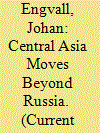

|
|
|
|
|
| Summary/Abstract |
Russia’s invasion of Ukraine has backfired, weakening Moscow economically, politically, and militarily, and these setbacks have undermined Moscow’s strategic position in its so-called near abroad. Russia had considered Central Asia one of its most secure regions of influence, thanks to a multitude of linkages developed over a long period. But the war and its repercussions are altering Russia’s relations with its five former colonies in Central Asia, which are looking to end old dependencies and form alternative partnerships with other powers.
|
|
|
|
|
|
|
|
|
|
|
|
|
|
|
|
| 2 |
ID:
192616
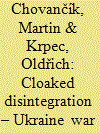

|
|
|
|
|
| Summary/Abstract |
Progress made in European defence-industrial integration has been subjected to the hardest test with the 2022 Russian invasion of Ukraine. The conflict has had profound implications for European defence industries across the board and spurred on massive investment into the sector. Based on extensive analysis of procurements, adopted policies, and shifts in discourse, we argue that the practical steps undertaken by Central and Eastern European (CEE) defence industries in the wake of the conflict are disintegrational. This is contrary to many discernible indicators which align with European integrational initiatives in defence. Moreover, the paper argues that the pattern of decisions taken by Central and Eastern European countries reinforces structural barriers to potential future European defence-industrial integration. The findings are significant to EU-wide, regional, and bilateral defence-industrial co-operation as well as national defence industrial strategies in reaction to the ongoing war in Ukraine.
|
|
|
|
|
|
|
|
|
|
|
|
|
|
|
|
| 3 |
ID:
193261
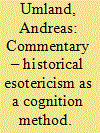

|
|
|
|
|
| Summary/Abstract |
A number of para-academic tendencies in Russian social science helped prepare the Ukraine war. In addition to propaganda and disinformation campaigns by the Kremlin, an intellectual deformation of the Russian elite by the Manichean ideas of such theorists as Lev Gumilyov and Aleksandr Dugin is partly responsible for Russia's increasing secession from Europe. Post-Soviet public discourse has become infected with an array of speculative, often conspiratorial, and sometimes occultist or racist theories. Their proponents have crowded out acknowledged social scientists and historians from intellectual and media debates. This parallel public discourse has been developing since the beginning of glasnost, 35 years ago, and became one of the determinants of Russia's attack on Ukraine in 2014.
|
|
|
|
|
|
|
|
|
|
|
|
|
|
|
|
| 4 |
ID:
193262
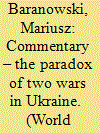

|
|
|
|
|
| Summary/Abstract |
The central thesis of this commentary focuses on the paradox of two wars occurring in parallel with Russian aggression in Ukraine. It is not just that—in addition to military action—there is a geopolitical tsunami and its consequences in the form of a possible food crisis, mass migration, or an already open energy war. The paradox relates to the fact that a potential Ukrainian victory could have adverse effects on the welfare of European countries as a consequence of the embargo on Russian hydrocarbons and the need to replace them (assuming there is no return to the ancien régime before the Russian aggression of February 24, 2022). The defeat of the Ukrainians, on the other hand, could lead to a so-called “new opening” and a gradual return to the import of Russian energy resources (which, although they will not obtain the pre-war volume, will provide energy stability for Europe in a period of diversifying contracts and developing investments in renewable energy sources).
|
|
|
|
|
|
|
|
|
|
|
|
|
|
|
|
| 5 |
ID:
193465
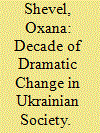

|
|
|
|
|
| Summary/Abstract |
The Euromaidan revolution was the start of a process of profound change in Ukrainian identity. Russian aggression has completed this turn to a pro-Western, anti-Russian orientation.
|
|
|
|
|
|
|
|
|
|
|
|
|
|
|
|
| 6 |
ID:
189707
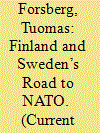

|
|
|
|
|
| Summary/Abstract |
In May 2022, Finland and Sweden both announced that they had decided to apply for membership in NATO. This was a dramatic shift in both countries’ foreign and security policies, but a logical consequence of their European Union membership and close partnership with NATO in the post–Cold War era. For both Finland and Sweden, the key motivation for joining NATO was the need for greater strategic stability in the face of Russia’s invasion of Ukraine. The swift decisions to cast aside their traditional military nonalignment cannot be understood without considering the strong emotional response in public opinion to Russia’s unprovoked war.
|
|
|
|
|
|
|
|
|
|
|
|
|
|
|
|
| 7 |
ID:
193462
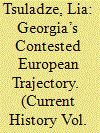

|
|
|
|
|
| Summary/Abstract |
In Georgia, the current ruling party has exploited the European integration process for both discursive and strategic purposes since it came to power in 2012. Georgia Dream’s seemingly recent deviation from the European course in fact has a longer history; it was already visible in 2014. This process further intensified in 2019, and escalated after Russia’s full-scale invasion of Ukraine in February 2022, when the party refused to join the EU’s sanctions against Russia and started openly criticizing European officials, while escalating attacks on liberal values.
|
|
|
|
|
|
|
|
|
|
|
|
|
|
|
|
| 8 |
ID:
192953
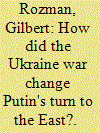

|
|
|
|
|
| Summary/Abstract |
Expectations that the Ukraine war would revitalize Vladimir Putin's "Turn to the East" were not realized. He had sought to link Ukraine and Taiwan in a struggle for a new order. If Xi Jinping's "Beijing straddle" countered the Washington-led international order, it mostly complied with Western sanctions. Russia had claimed to be the coequal driver of the reordering of the East, but a war presumed to raise its stature in China had the opposite effect. The "Turn to the East" shifted further to a "turn toward China," and Xi determines the timing of the East-West confrontation. The war, coupled with anger over the victory of Yoon Suk-yeol, tilted Moscow further to North Korea over South Korea. Japan finally pulled the plug on Shinzo Abe's legacy of wooing Putin. Russia's turn to China played poorly in India, too, although it clung to cooperation in part to restrain a further shift. Even Russian hopes for ASEAN were set back. The war's impact in the East defied Putin's intentions.
|
|
|
|
|
|
|
|
|
|
|
|
|
|
|
|
| 9 |
ID:
193461
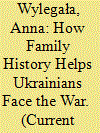

|
|
|
|
|
| Summary/Abstract |
Ukrainians displaced by the current Russian invasion frequently turn to family memories of a previous war to understand and cope with their situation. In an oral history project, Ukrainian refugees often compared Russian actions to World War II–era war crimes perpetrated in Ukraine by Nazi Germany—and many assert that the Russians today are worse. These experiences have fueled an intense hatred of the Russians, even among Russian-speakers. For these Ukrainians, the idea of the Russkii mir, or “Russian world,” binding post-Soviet countries in a common civilization, has been discredited.
|
|
|
|
|
|
|
|
|
|
|
|
|
|
|
|
| 10 |
ID:
187982
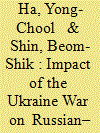

|
|
|
|
|
| Summary/Abstract |
This article examines the impact of the Ukraine war on Russian–North Korean relations at three different levels. At the international level, the war will bring two power groups into confrontation. The closer security cooperation between Russia and China will form an illiberal group that will set the security environment for North Korea to establish a new international identity. At the regional level, Russian–Chinese security alignment will be reinforced, which North Korea will exploit. At the bilateral level, Russian–North Korean relations will be strengthened as Russia’s influence in Northeast Asia wanes.
|
|
|
|
|
|
|
|
|
|
|
|
|
|
|
|
| 11 |
ID:
184983
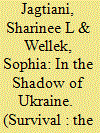

|
|
|
|
|
| Summary/Abstract |
In 2022, India captured global attention over its response to the war in Ukraine. While calling for both parties’ return to diplomacy, India abstained from several United Nations resolutions condemning Russian aggression. For a country that ostensibly subscribes to the values of democracy and territorial integrity, its response appeared frustrating and contradictory, but it is broadly consistent with its long-standing policy of non-alignment. Although India’s relationship with China is increasingly contentious, New Delhi is not yet fully convinced that it is in India’s interest to swing westwards. The country’s relations with Russia and China are deep, complex and substantive. In addition to the military and economic benefits it derives from its connection with Russia, New Delhi and Moscow share an avowed preference for a more equal, multipolar world. India will eventually have to reflect on the extent to which it can sustain its balancing act.
|
|
|
|
|
|
|
|
|
|
|
|
|
|
|
|
| 12 |
ID:
192653
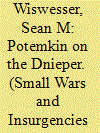

|
|
|
|
|
| Summary/Abstract |
Russia’s airpower failure in the Ukraine war was due to incompetent air campaigning and execution, coupled with the success of a highly effective Ukrainian ground-based air defense. The Russian Air Forces (VKS) attempted to execute what they term a ‘Strategic Air Operation’ based on a ‘non-contact’ doctrine, articulated widely in recent years. But they could not achieve this in practice. As a result, like the famous Potemkin Village of Catherine the Great’s time, Russia’s Air Force today is only a façade of a modern twenty-first-century Air Force. Throughout the first eight months of the invasion, Russia failed to achieve air superiority, failed at suppression of enemy air defense, and failed to deny the use of airpower to its adversary. The absence of Russian airpower was prominently on display during the September 2022 counterattack in the Kharkiv area, where Ukraine took back 3,000 plus square miles of its territory and again with the counteroffensives in the south, where Ukraine retook Kherson. This paper explores both the ‘how’ of Russia’s airpower failure along with ‘why’ it could not execute its own stated doctrine.
|
|
|
|
|
|
|
|
|
|
|
|
|
|
|
|
| 13 |
ID:
193460
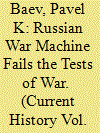

|
|
|
|
|
| Summary/Abstract |
The Russian military has failed the tests of the Ukraine war, and its leadership and chain of command are seriously compromised. A costly modernization program failed to deliver the promised superiority in key weapon systems, offensive capabilities are exhausted, and the quality of manpower has deteriorated. The ill-fated reliance on the Wagner Group was a result of this degradation. Nuclear weapons cannot be used to break the pattern of slow-moving defeat, and the resource base for sustaining the long war is being depleted. In the medium term, Russia cannot count on rehabilitating its capacity for threatening its neighbors.
|
|
|
|
|
|
|
|
|
|
|
|
|
|
|
|
|
|
|
|
|